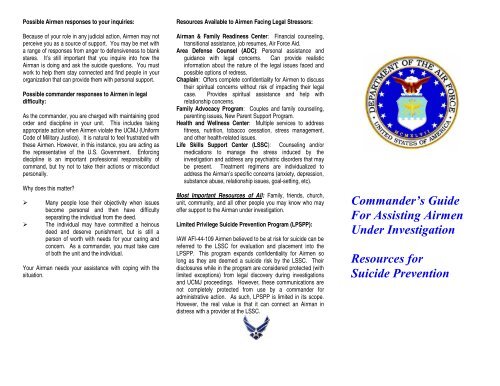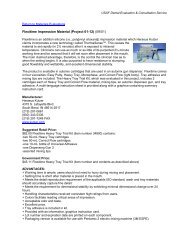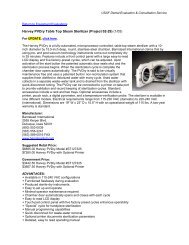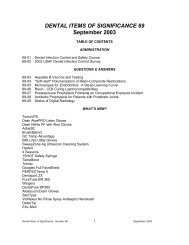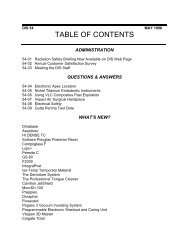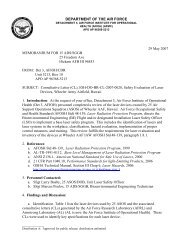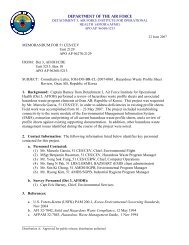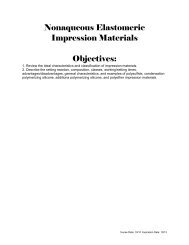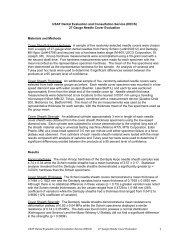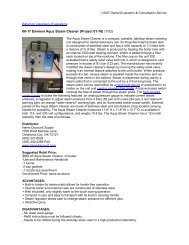Commander's Guide For Assisting Airmen Under Investigation ...
Commander's Guide For Assisting Airmen Under Investigation ...
Commander's Guide For Assisting Airmen Under Investigation ...
You also want an ePaper? Increase the reach of your titles
YUMPU automatically turns print PDFs into web optimized ePapers that Google loves.
Possible <strong>Airmen</strong> responses to your inquiries:<br />
Because of your role in any judicial action, <strong>Airmen</strong> may not<br />
perceive you as a source of support. You may be met with<br />
a range of responses from anger to defensiveness to blank<br />
stares. It’s still important that you inquire into how the<br />
Airman is doing and ask the suicide questions. You must<br />
work to help them stay connected and find people in your<br />
organization that can provide them with personal support.<br />
Possible commander responses to <strong>Airmen</strong> in legal<br />
difficulty:<br />
As the commander, you are charged with maintaining good<br />
order and discipline in your unit. This includes taking<br />
appropriate action when <strong>Airmen</strong> violate the UCMJ (Uniform<br />
Code of Military Justice). It is natural to feel frustrated with<br />
these <strong>Airmen</strong>. However, in this instance, you are acting as<br />
the representative of the U.S. Government. Enforcing<br />
discipline is an important professional responsibility of<br />
command, but try not to take their actions or misconduct<br />
personally.<br />
Why does this matter?<br />
Many people lose their objectivity when issues<br />
become personal and then have difficulty<br />
separating the individual from the deed.<br />
The individual may have committed a heinous<br />
deed and deserve punishment, but is still a<br />
person of worth with needs for your caring and<br />
concern. As a commander, you must take care<br />
of both the unit and the individual.<br />
Your Airman needs your assistance with coping with the<br />
situation.<br />
Resources Available to <strong>Airmen</strong> Facing Legal Stressors:<br />
Airman & Family Readiness Center: Financial counseling,<br />
transitional assistance, job resumes, Air <strong>For</strong>ce Aid.<br />
Area Defense Counsel (ADC): Personal assistance and<br />
guidance with legal concerns. Can provide realistic<br />
information about the nature of the legal issues faced and<br />
possible options of redress.<br />
Chaplain: Offers complete confidentiality for <strong>Airmen</strong> to discuss<br />
their spiritual concerns without risk of impacting their legal<br />
case. Provides spiritual assistance and help with<br />
relationship concerns.<br />
Family Advocacy Program: Couples and family counseling,<br />
parenting issues, New Parent Support Program.<br />
Health and Wellness Center: Multiple services to address<br />
fitness, nutrition, tobacco cessation, stress management,<br />
and other health-related issues.<br />
Life Skills Support Center (LSSC): Counseling and/or<br />
medications to manage the stress induced by the<br />
investigation and address any psychiatric disorders that may<br />
be present. Treatment regimens are individualized to<br />
address the Airman’s specific concerns (anxiety, depression,<br />
substance abuse, relationship issues, goal-setting, etc).<br />
Most Important Resources of All: Family, friends, church,<br />
unit, community, and all other people you may know who may<br />
offer support to the Airman under investigation.<br />
Limited Privilege Suicide Prevention Program (LPSPP):<br />
IAW AFI-44-109 <strong>Airmen</strong> believed to be at risk for suicide can be<br />
referred to the LSSC for evaluation and placement into the<br />
LPSPP. This program expands confidentiality for <strong>Airmen</strong> so<br />
long as they are deemed a suicide risk by the LSSC. Their<br />
disclosures while in the program are considered protected (with<br />
limited exceptions) from legal discovery during investigations<br />
and UCMJ proceedings. However, these communications are<br />
not completely protected from use by a commander for<br />
administrative action. As such, LPSPP is limited in its scope.<br />
However, the real value is that it can connect an Airman in<br />
distress with a provider at the LSSC.<br />
Commander’s <strong>Guide</strong><br />
<strong>For</strong> <strong>Assisting</strong> <strong>Airmen</strong><br />
<strong>Under</strong> <strong>Investigation</strong><br />
Resources for<br />
Suicide Prevention
<strong>Airmen</strong> with legal stressors: A high-risk population<br />
<strong>Airmen</strong> under investigation are at elevated risk for suicide.<br />
Suicide risk is elevated for those who have received an<br />
unfavorable information file (UIF) or face possible loss of a<br />
career through involuntary separation. Expect investigations<br />
of any type (i.e., Office of Special <strong>Investigation</strong>s, the Inspector<br />
General, civilian criminal investigations, commander-directed<br />
investigations) to increase an Airman’s stress level as they<br />
are time-consuming, have uncertain outcomes, and carry<br />
consequences for an individual’s reputation and career, either<br />
within or outside of the military.<br />
To reduce suicide risk, commanders must actively address<br />
the unique risk factors of personnel who are facing legal<br />
stressors. This pamphlet is designed to assist commanders<br />
by outlining helping resources and specific action strategies.<br />
Key Support Steps:<br />
Commanders and first sergeants should utilize the following<br />
to reduce suicide risk for those under investigation:<br />
Engage in dialogue with the Civilian legal system<br />
(i.e., local jails). Incarceration increases risk for<br />
completing suicide, so coordination with civilian<br />
authorities is vital. When an Airman is incarcerated,<br />
advise local jails to monitor the at-risk member for<br />
suicidal behavior. Perform morale checks on <strong>Airmen</strong> in<br />
local jails.<br />
Investigative Interview Hand-off Policy. <strong>Airmen</strong> must<br />
be handed off directly to their supervisor, commander, or<br />
first sergeant immediately following any investigative<br />
subject interview. Leaders should observe the Airman’s<br />
reaction to the interview, coping and emotional state,<br />
and be ready to immediately engage helping agencies<br />
when indicated.<br />
Keep engaged. Maintain an active awareness of the<br />
investigation and legal process. Interested commanders<br />
help move the process along.<br />
Prevent Social Isolation. Emphasize to first-line<br />
supervisors that the member is still a part of the team<br />
and, unless pretrial restraints are imposed, should not be<br />
isolated from the rest of the unit.<br />
Point members to legal resources only after<br />
coordinating with, and obtaining approval from both the<br />
interested/affected military investigative entity (AFOSI,<br />
SFOI, etc.) and the servicing SJA. This is done to ensure<br />
that, by encouraging an Airman to seek legal counsel, you<br />
will not interfere with or compromise any ongoing<br />
investigation. When cleared to point an Airman to legal<br />
resources, provide the Airman with the phone number for<br />
the ADC and general guidelines for how they may help.<br />
Note: This step, when taken, will generally occur after the<br />
investigating agency has completed their final interview of<br />
the Airman under investigation. Rest assured that all<br />
<strong>Airmen</strong> under investigation are made aware of their legal<br />
rights prior to answering any potentially incriminating<br />
questions.<br />
What do I look for?<br />
It’s important that commanders and other unit personnel<br />
maintain contact with <strong>Airmen</strong> who are aware they are under<br />
investigation. Regular check-ins with the Airman under<br />
investigation are vital. Whether you are concerned about<br />
suicide or not, it is important to regularly evaluate how an<br />
affected Airman is managing the stress of the investigation.<br />
Commanders and First Sergeants should regularly ask<br />
questions about suicide and coping. In assessing how an<br />
affected Airman is coping, it is valuable to seek collateral<br />
sources of information, such as peers and supervisors.<br />
Be on the lookout for these signs of distress:<br />
• Increased use of alcohol<br />
• Behavioral changes (Social isolation, deteriorating<br />
work performance, unkempt appearance, decreased<br />
participation in activities, increased conflicts)<br />
• Cognitive changes (decreased concentration,<br />
memory lapses)<br />
• Mood changes (continuously angry, sad, or irritable,<br />
and/or frequent mood fluctuations)<br />
• Feelings of hopelessness & helplessness (“Things will<br />
never get better,” “There’s no way out,” “My life is over.”)<br />
• Asking about suicide will only help. Talking about<br />
suicide does not increase its likelihood.<br />
Assess coping and suicide risk. Asking <strong>Airmen</strong> who are<br />
aware they are under investigation these questions may be<br />
uncomfortable, but, by doing so, you convey caring and<br />
concern, and give permission to talk about difficult subjects.<br />
“How are you dealing with your situation?”<br />
“Who are you talking with to help cope with your<br />
situation?”<br />
“Is there anything I can do to help?”<br />
“Have you had thoughts about suicide?”<br />
If YES:<br />
“How might you kill yourself?”<br />
“Do you have the means to kill yourself?”<br />
“Have you decided when you would kill<br />
yourself?”<br />
“What keeps you from killing yourself?”<br />
“Have you done anything to hurt yourself?”<br />
What to do if an Airman endorses suicidal thoughts:<br />
Assess the extent of risk and determine the<br />
presence of weapons or other means of selfharm.<br />
Ask all the suicide questions above.<br />
Your first priority is to keep the Airman safe.<br />
Do not leave the Airman alone.<br />
Remove all potential weapons and means of<br />
harm (medications, pens, keys, matches,<br />
lighters, rope).<br />
Involve police agencies if the individual will<br />
not give up weapons voluntarily.<br />
If there is time, consult with a Life Skills provider.<br />
Arrange transport to LSSC or local emergency<br />
room.<br />
Have someone sit next to all doors of the<br />
vehicle during transport – the individual<br />
should not sit next to a door. Consider<br />
ambulance or police transport, if safe unit<br />
transport cannot be arranged.<br />
Choose a same gender escort whenever<br />
possible.<br />
Ensure you follow referral procedures<br />
identified in DoDD 6490.1 and DoDI 6490.4.


